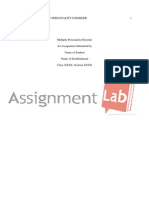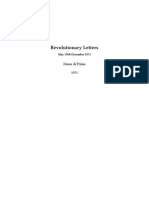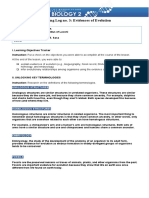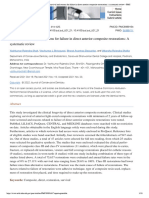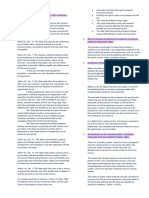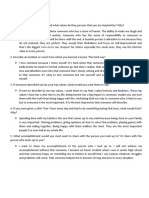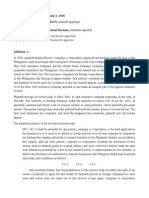Abstract - Bringing Human Rights Into Focus in Medical Education
Uploaded by
Michael RoweCopyright:
Available Formats
Abstract - Bringing Human Rights Into Focus in Medical Education
Uploaded by
Michael RoweCopyright
Available Formats
Share this document
Did you find this document useful?
Is this content inappropriate?
Copyright:
Available Formats
Abstract - Bringing Human Rights Into Focus in Medical Education
Uploaded by
Michael RoweCopyright:
Available Formats
Bringing human rights into focus in medical education
Veronica Mitchell
Michael Rowe
Sue Statham
South Africa’s history of human rights violations is well documented, especially in the field
of healthcare. The issues raised during the Truth and Reconciliation Commission allowed
us to develop a deeper understanding of the complicity of healthcare practitioners in
human rights abuses, and helped to put into place policies to prevent their recurrence.
However, ethical and human rights dilemmas in health are as relevant today as ever
before.
As educators, our responsibility is to incorporate a human rights approach into our
teaching, guiding our students and colleagues towards an awareness of social and
distributive justice that is reflected in actual practice. Recently, the role of human rights in
healthcare has been brought to the fore with the announcement by the Health Professions
Council of South Africa of a mandatory accumulation of 5 Ethics CPD points per year,
further acknowledging the importance of human rights in health.
This workshop has the following intended outcomes:
1. To describe and illustrate the link between human rights and health in promoting
and protecting well-being in a holistic manner for all.
2. To provide a space where dialogue on human rights issues can be openly
discussed.
3. To illustrate how to integrate a human rights approach into our educational practice,
and how to support students and colleagues in interpreting health through a human
rights framework.
4. To interpret case studies involving human rights dilemmas that health personnel
face in practice.
The workshop will include presentations, discussion and groupwork that will allow
participants to actively engage with the subject matter. The intention is that participants
will leave with an increased awareness of the opportunities for incorporating a human
rights approach in their respective curricula.
Brief Curriculum Vitae for Veronica Mitchell, Michael Rowe and Sue Statham
Veronica Mitchell is a physiotherapist who is presently a Masters student in Higher
Education at the University of Cape Town. She facilitates several undergraduate student
courses in the Health Sciences Faculty at UCT, including Problem Based Learning.
While teaching a multidisciplinary group of 1 st year students, Veronica realized the
potential impact of human rights teaching in medical education. Inspired by participation in
Prof Leslie London and Prof Laurel Ragaven-Baldwin’s Train-the-Trainer course in 2004,
she pursued further training through the Human Rights Education Association, USA and
Equitas, Canada. In 2007, with the support of the School of Public Health, Veronica
initiated a pilot project facilitating health and human rights workshops with 3 rd year students
in their Women’s Health block in the Obstetrics and Gynaecology Department. These
workshops have been described by students and clinicians as a “highlight”.
Michael Rowe is a physiotherapist and currently a doctoral student and lecturer at the
University at the Western Cape. In addition to teaching various applied subjects, he is
responsible for the Professional Ethics in Physiotherapy module, taught from 2 nd - 4th year.
His research interest is in curriculum development within an e-learning framework.
As part of his professional development in this area, he attended the “Health and Human
Rights” Train-the-Trainer course presented by Professors Leslie London and Laurel
Ragaven-Baldwin in January 2009. He consequently restructured the ethics module to
better reflect the role of human rights in health and has since initiated a project
implementing a “human rights thread” throughout the physiotherapy undergraduate
curriculum. Furthermore, he is developing an integrated ethics module in collaboration
with the physiotherapy department at the University of Missouri in the United States.
Sue Statham is a physiotherapist who has been working in the Primary Health Care
approach for more than 14 years. She has been actively involved in teaching students in
the clinical environment and planning service delivery using the WHO, United Nations, and
South African Rehabilitation policy as guidelines. She initiated a community based
rehabilitation project in Bishop Lavis and is involved in numerous other projects that
involve a community based approach.
Sue is currently involved in a research project which aims to use a human rights based
approach to evaluate rehabilitation services. The importance of a human rights based
approach was highlighted by participation in Prof Leslie London and Prof Laurel Ragaven-
Baldwin’s Train-the-Trainer course in 2009. This work will take a leading role in further
developments on both the education and research aspects of her work.
You might also like
- The Subtle Art of Not Giving a F*ck: A Counterintuitive Approach to Living a Good LifeFrom EverandThe Subtle Art of Not Giving a F*ck: A Counterintuitive Approach to Living a Good Life4/5 (6058)
- The Gifts of Imperfection: Let Go of Who You Think You're Supposed to Be and Embrace Who You AreFrom EverandThe Gifts of Imperfection: Let Go of Who You Think You're Supposed to Be and Embrace Who You Are4/5 (1142)
- Never Split the Difference: Negotiating As If Your Life Depended On ItFrom EverandNever Split the Difference: Negotiating As If Your Life Depended On It4.5/5 (918)
- Hidden Figures: The American Dream and the Untold Story of the Black Women Mathematicians Who Helped Win the Space RaceFrom EverandHidden Figures: The American Dream and the Untold Story of the Black Women Mathematicians Who Helped Win the Space Race4/5 (946)
- The Hard Thing About Hard Things: Building a Business When There Are No Easy AnswersFrom EverandThe Hard Thing About Hard Things: Building a Business When There Are No Easy Answers4.5/5 (361)
- Devil in the Grove: Thurgood Marshall, the Groveland Boys, and the Dawn of a New AmericaFrom EverandDevil in the Grove: Thurgood Marshall, the Groveland Boys, and the Dawn of a New America4.5/5 (273)
- The World Is Flat 3.0: A Brief History of the Twenty-first CenturyFrom EverandThe World Is Flat 3.0: A Brief History of the Twenty-first Century3.5/5 (2283)
- A Heartbreaking Work Of Staggering Genius: A Memoir Based on a True StoryFrom EverandA Heartbreaking Work Of Staggering Genius: A Memoir Based on a True Story3.5/5 (233)
- Control Llama Honeywell RM7897A1002, RM7897C1000No ratings yetControl Llama Honeywell RM7897A1002, RM7897C100016 pages
- 2023 NZEnvC 122 Morrison V Dunedin City CouncilNo ratings yet2023 NZEnvC 122 Morrison V Dunedin City Council9 pages
- Banana: Jump To Navigationjump To SearchNo ratings yetBanana: Jump To Navigationjump To Search2 pages
- Pipe and Tool Joint Specification Data Table DPINo ratings yetPipe and Tool Joint Specification Data Table DPI6 pages
- Acute Flaccid Paralysis: Moderator: Dr. Bhavana Koppad Asso. Professor Dept of Pediatrics, JNMCNo ratings yetAcute Flaccid Paralysis: Moderator: Dr. Bhavana Koppad Asso. Professor Dept of Pediatrics, JNMC32 pages
- Study of Fly Ash Cement Concrete Pavement: Anjali Yadav 1, Nikhil Kumar YadavNo ratings yetStudy of Fly Ash Cement Concrete Pavement: Anjali Yadav 1, Nikhil Kumar Yadav6 pages
- Learning Log No. 3: Evidences of Evolution: Analogous StructuresNo ratings yetLearning Log No. 3: Evidences of Evolution: Analogous Structures4 pages
- Long-Term Survival and Reasons For Failure in Direct Anterior Composite Restorations - A Systematic ReviewNo ratings yetLong-Term Survival and Reasons For Failure in Direct Anterior Composite Restorations - A Systematic Review10 pages
- Lesson 4 Talking About Family A. Introduction: B. Presentation 1. Read and Practice The Following DialoguesNo ratings yetLesson 4 Talking About Family A. Introduction: B. Presentation 1. Read and Practice The Following Dialogues6 pages
- LABSTAND - Usita MT FT Qs Compilation With Suggested AnswersNo ratings yetLABSTAND - Usita MT FT Qs Compilation With Suggested Answers14 pages
- Manila Electric Co. v. Yatco, G.R. No. 45697, November 1, 1939No ratings yetManila Electric Co. v. Yatco, G.R. No. 45697, November 1, 19394 pages












































